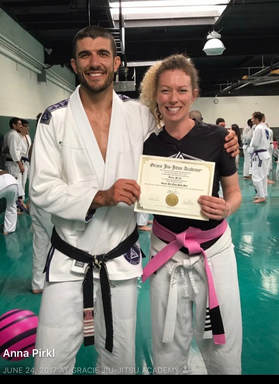Non-Judging
I have learned at Gracie to quiet my inner critic. I tend to be a very self-critical, excellence driven person and it took many months of allowing space for imperfection to learn to laugh at myself, shrug it off and keep going. The instructors are skilled in working with the perfectionistic student. They are encouraging and positive throughout. For example, an instructor would never tell you “you’re doing it wrong”, but instead praise what is right and make small adjustments, always conscious not to overwhelm a student with too many instructions. This was exactly what I needed to stay motivated and feel a sense of mastery developing throughout the process.
Patience / Persistence
Patience is of tremendous value at Gracie and a significant challenge for me. The teachers continually emphasize that the techniques are complex and many times counterintuitive. There simply is no jiu-jitsu without patience and persistence. Instructors often remark that is fantastic if a new student gets 25% on the first try of a technique. The benefits of the skills I get at Gracie extend outside those walls. A pronounced example for me is driving. I have always been an aggressive driver speeding, weaving, and wanting people to get out of my way. On difficult days, I find myself falling into old habits of speeding all the way to class at Gracie. As I am leaving their parking lot, driving home, I find myself more patient, waiting my turn, not pushing, not hurrying and letting people in whenever I get a chance.
Willingness / Beginner’s Mind
Instructors model a humanistic approach in their teaching, regularly sharing personal trials and errors on their journeys of learning jiu-jitsu. They model how to stay motivated and keep coming back. For the novice, a sense of curiosity and readiness to learn from a place of not knowing is nurtured. Many techniques are counterintuitive and require proper training to conceptualize. The clinch move is an excellent example. If someone attempts to punch you, you move towards them rather than away. To this day, my clinch sometimes needs work when I’m not concentrating as I instinctively don’t want to move myself towards the attacker.
Trust
Most techniques in jiu-jitsu require a high level of trust. Allowing someone to put their hands on your neck can push a trauma survivor out of their comfort zone. At Gracie they instruct participants to only put hands on shoulders to begin with and then as they advance, to put hands on throats, and eventually pressure. This helps the person desensitize to any associated discomfort and build trust. In addition, safety is a priority. When teaching a technique, they always emphasize how to keep your training partner safe. Extensive time is spent on how to break falls and accomplish training goals while preventing injury. Instructors and assistants circulate the room at all times, checking everyone’s safety and techniques. Newer participants are paired up with seasoned trainees to help newer students with the technique and also set the structure of safety (moving slowly, tapping early, frequent communication, continued verbalizations of safety tips throughout practicing, etc.). It has been a significant corrective experience for me to have many women and men take careful consideration of my safety while training.
Non-Striving
When I try too hard and train too hard, my body lets me know immediately. Instructors are quick to encourage taking care of your body. They emphasize that sitting and watching is sometimes better than participating. I was once told “Take breaks from jiu-jitsu before it breaks you.” I find it difficult to take breaks because as a trauma survivor, feeling powerful is intoxicating.
Acceptance
I have had to learn at Gracie to accept my limitations. I train with men that are much bigger and stronger than me. When I master techniques, their size and strength doesn’t matter anymore. However, as a result of this difference, I have had to accept the reality that I need to know the techniques better than these men to accomplish control and safety. I have successfully executed the double leg takedown on a 250 pound man. I also managed to keep control of a 250 pound man in side mount control. I have had to accept the limitations of my age and strength, but in doing so I have also learned how to manage my limitations effectively.
Letting Go / Attunement
Having fun while making mistakes has been another corrective experience. Much of my abuse was centered on punishment for academic mistakes. To train in jiu-jitsu is to make 1000’s of mistakes and have fun while doing it. Newcomers to Master Cycle joke often that all they are trying to do is stay safe or just breathe. One of Gracie Jiu-Jitsu principles involves a concept of going with the flow. Once you have become fixated on accomplishing a particular submission, you inevitably create an opening for the attacker to defend against and even roll to an advantage. “Position before submission” is a concept that involves letting go of potential submissions in order to stay fluid and attuned so you can respond to what is given to you. Some of the best jiu-jitsu I have watched seems more like a dance than combat.
Friendliness / Gentleness
Smiles, hand shakes, and laughter set the tone at Gracie. Gentleness and consideration of your partner is emphasized every step of the way. Keeping each other safe and happily learning is a top priority and a great deal of time is spent making sure that trainees treat each other with respect and care. If any student is too aggressive or not assisting their partner in the “Gracie” encouraging way, they are quickly addressed and asked to leave if the problem persists. I will never forget my first partner – a young instructor from Mississippi showing me the “trap and roll” technique. He performed this technique with speed and precision while carefully cradling my shoulder and moving me in a way that protected me from muscle strain or injury. I am so grateful that he set the stage for me to know and feel how easy, fun and gentle the learning process could be.
Non-Reactivity / Confidence
As a trauma survivor, trigger reactivity has caused significant impairment in my life. When I first thought of testing for my Pink Belt, I knew that most candidates tested with Eve Torres Gracie, the female director of WE. I was concerned that in the reflex testing portion, where you are approached with a variety of attacks to which you must instinctively respond, that I would be triggered and might actually punch Eve. I came to understand that if I was still in a space of this type of reactivity, I was not ready to test.
As I continued my training, I instinctively put myself with the stronger partners in Women Empowered in order to push myself outside my comfort zone. As the weeks passed and I was feeling more confident with my skills, I scheduled a “pre-test” with a Alex Ueda. I felt very comfortable with this instructor and I did well. He explained that had it been a real test, I would have passed. Around the same time, I had noticed that whenever I was called upon to demonstrate a technique with Rener Gracie (Eve’s husband), I became reactive. I was not listening to his words, I moved too quickly and wanted to get as far away from him as fast as I could. It was odd because I admire his teaching, his gentleness, his encouragement and everything that Eve and Rener had created. But when he came anywhere near me, I got tense. After examining my thoughts, I remembered an ad for their gym about 20 years ago, and at that time decided it was not a safe place for me. I realized that in that ad, Rener looked like an attacker from my childhood.
I searched for the Facebook page of this attacker and it all came flooding back as I looked at his photo. I felt my body tense up, get nauseous, chest and stomach tight and breath being held. I reached out to Eve to share my discovery. She expressed gratitude that I entrusted her with my experience and that they had many trauma survivors over the years participate. She shared her experience that everyone responds to trauma differently and that they valued learning what would help me best (less contact with Rener, more, same). Her response was healing, validating and assuring that I was safe in this space. I felt so safe with her support that I asked if I might actually test with Rener as I knew it would be a true test for me of my abilities when triggered. Rener said yes.
From the time he entered the room for the test, I became 14 years old all over again. In a small room, door closed with Rener between me and the door, Rener calmly and slowly explained everything step by step. He encouraged me. It was not a surprise to me that I performed worse with Rener than I had performed with Alex. There were a couple very basic skills that flew straight out of my head when Rener put his hands around my neck. However, I was a triggered “14 year old” with a brand new set of skills and I passed the test. Since then I have had ample time to strengthen the reflexes of the few techniques in which I froze.
The thrill of passing with Rener was an enormous confidence booster. However what happened after the test was really remarkable. I opened up my attackers Facebook page again. Now as I looked at it, my body was calm. There was no reaction, no nausea, no chest tightening. I felt peaceful and I said out loud, “You are not a threat to me anymore, and I forgive you.” After years of therapy to recover from trauma, my logical mind knew I was safe but my body had to catch up.
The “victim” becomes a warrior at Gracie. It’s the complete opposite of the trauma suffered. I particularly like that almost all of the training emphasizes control over your attacker without submitting or hurting them. I can still remain compassionate and kind while strong in relationship to my attacker. I don’t have to become them (angry, aggressive, violent) to defend myself.
Conclusion
The scattered pieces of myself in my trauma narrative forgot about the warrior that I am (my strengths, my coping skills). This unique opportunity to grow in a safe and supportive environment allowed me to remember my true self and put myself back together. My whole body has learned to operate with calmness and fluidity to accomplish my jujitsu goals and heal the memory. It’s a challenge to express the full extent of gratitude for this program and what it has done for both my clients and me personally. I wish every trauma survivor would have the experience of profound healing that I have had at Gracie University. It has been, and continues to be, a spiritual jiu-jitsu journey for me.














